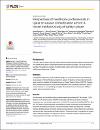Perspectives of healthcare professionals in Qatar on causes of medication errors: A mixed methods study of safety culture

View/
Date
2018Author
Stewart D.Thomas B.
MacLure K.
Pallivalapila A.
El Kassem W.
Awaisu A.
McLay J.S.
Wilbur K.
Wilby K.
Ryan C.
Dijkstra A.
Singh R.
Al Hail M.
...show more authors ...show less authors
Metadata
Show full item recordAbstract
Background There is a lack of robust, rigorous mixed methods studies of patient safety culture generally and notably those which incorporate behavioural theories of change. The study aimed to quantify and explain key aspects of patient safety culture which were of most concern to healthcare professionals in Qatar. Methods A sequential explanatory mixed methods design of a cross-sectional survey followed by focus groups in Hamad Medical Corporation, Qatar. All doctors, nurses and pharmacists were invited to complete the Hospital Survey on Patient Safety Culture (HSOPS). Respondents expressing interest in focus group participation were sampled purposively, and discussions based on survey findings using the Theoretical Domains Framework (TDF) to explain behavioural determinants. Results One thousand, six hundred and four questionnaires were received (67.9% nurses, 13.3% doctors, 12.9% pharmacists). HSOPS composites with the lowest levels of positive responses were non-punitive response to errors (24.0% positive) and staffing (36.2%). Specific TDF determinants potentially associated with these composites were social/professional role and identity, emotions, and environmental context and resources. Thematic analysis identified issues of doctors relying on pharmacists to correct their errors and being reluctant to alter the prescribing of fellow doctors. There was a lack of recognition of nurses? roles and frequent policy non-adherence. Stress, workload and lack of staff at key times were perceived to be major contributors to errors. Conclusions This study has quantified areas of concern relating to patient safety culture in Qatar and suggested important behavioural determinants. Rather than focusing on changing behaviour at the individual practitioner level, action may be required at the organisational strategic level to review policies, structures (including resource allocation and distribution) and processes which aim to promote patient safety culture.
Collections
- Pharmacy Research [1450 items ]

